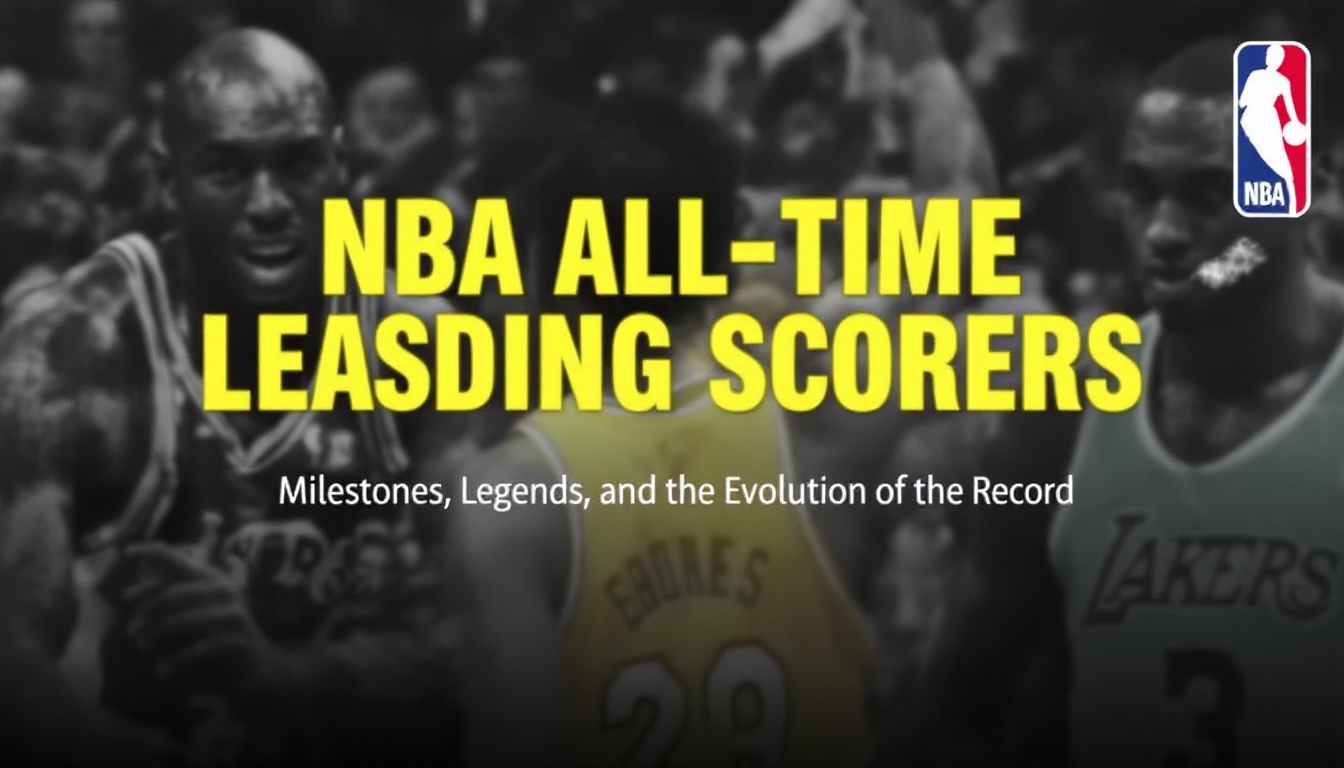The NBA all-time leading scorers leaderboard is a defining measure of individual achievement in basketball. It serves as a record of persistence, skill, and consistency, highlighting players whose performances have shaped the history of the league.
Tracking scoring milestones offers valuable insight into a player’s career and their impact over time. It underscores shifts in playing style, team strategies, and league priorities, helping fans and analysts track changes across decades.
Followers of the NBA continue to focus on this leaderboard to witness new records and celebrate enduring legacies. The attention given to these marks reflects the respect for those who have left a lasting impression on the sport.
The Elite Club: NBA’s Top 10 All-Time Leading Scorers
Since its inception, the NBA has celebrated remarkable individual performances and enduring consistency on the court. Among its most respected achievements is joining the ranks of the all-time leading scorers—a testament to skill, longevity, and impact on the game. The current top ten features superstars who have raised the bar for excellence and changed the course of basketball history.
LeBron James: The New All-Time Scoring King
LeBron James stands alone as the NBA’s top scorer, having surpassed 42,000 career points. He reached this milestone after more than two decades of high-level play, averaging over 27 points per game for his career. James displayed remarkable adaptability, excelling with multiple teams and roles while maintaining elite efficiency.
His scoring journey highlights:
- Surpassed Kareem Abdul-Jabbar’s previously unbreakable record in the 2022-23 season.
- Consistently posted season averages above 25 points per game, even into his late 30s.
- Holds the all-time playoff points record, becoming the most prolific scorer in postseason history.
- Has more than 20 seasons with at least 25 points per game—a rare combination of durability and dominance.
This feat is significant because James redefined scoring longevity. Few imagined a player would reach and exceed the 42,000-point threshold. His ascent illustrates not only personal excellence but also the ongoing shift in NBA offense and the importance of versatility at the highest level. For a more detailed look at his career totals and season-by-season scoring, refer to the official NBA scoring leaders page.
Kareem Abdul-Jabbar’s Enduring Legacy
For nearly four decades, Kareem Abdul-Jabbar’s 38,387 points stood as the benchmark. Known for his patented skyhook—a shot nearly impossible to block—Kareem was the model of consistency. He built his total across 20 seasons, averaging 24.6 points per game and never scoring fewer than 10 points per game in any season.
Key elements of Kareem’s legacy:
- Six-time NBA champion and six-time MVP, combining individual accolades with team success.
- Used the skyhook to dominate from the low post, a technique that became his signature and remains unrivaled in effectiveness.
- Led the league in scoring twice but never sacrificed efficiency for volume.
- His record stood amid shifts in playing style, highlighting his adaptability and value in any era.
Beyond the numbers, Abdul-Jabbar’s career showed what could be achieved with discipline, technical mastery, and innovation. As Pat Riley stated in a reflection on Kareem’s impact, his influence goes beyond the court, shaping the identity of NBA big men for generations.
Other Legends in the Top 10
The remaining members of the NBA’s top ten career scorers each carved their own path, leaving legacies defined by skill, persistence, and memorable moments.
- Karl Malone: With 36,928 points, Malone’s strength and scoring on the move powered him to second place for many years. He averaged 25 points per game over 19 seasons and played almost every contest with the Utah Jazz, forming a historic partnership with John Stockton.
- Kobe Bryant: Scoring 33,643 points, Bryant’s career was defined by relentless competitiveness and artistry on offense. He scored 81 points in a single game (second-most in NBA history) and retired with a memorable 60-point finale. His legacy is anchored in skill, footwork, and leadership.
- Michael Jordan: While Jordan finished fifth overall with 32,292 points, his 30.1 career points-per-game average remains the highest in league history. Jordan won ten scoring titles and anchored the Chicago Bulls to six championships, making his mark on both the statistics sheet and the sport’s cultural identity.
The current top 10 list includes other prolific names—Dirk Nowitzki, Wilt Chamberlain, Shaquille O’Neal, Kevin Durant, and Carmelo Anthony—each bringing unique skill sets and record-setting milestones. Full statistics and rankings can be found on the NBA’s career scoring leaderboard.
 Photo by RDNE Stock project
Photo by RDNE Stock project
What It Takes: Scoring Longevity and Consistency
NBA all-time scoring leaders possess an uncommon combination of endurance, skill, and adaptability. Their ability to remain productive across changing team roles, coaching styles, and league trends sets them apart from other greats. Two key themes define this achievement: the tug between sheer volume and scoring efficiency, and the impact of changing basketball eras.
Games Played vs. Points Per Game: Accumulation vs. Efficiency
Players reach the top of the all-time scoring list through different paths. Some, like Kareem Abdul-Jabbar and Karl Malone, built their totals over extensive careers, rarely missing games and maintaining steady production. Accumulation through availability has always mattered. A player who maintains a yearly average of 25 points per game across two decades solidifies their place among the scoring elite.
Others, including Michael Jordan and Kevin Durant, made their marks with dominant scoring averages, often exceeding 30 points per game at their peaks. High efficiency carries weight; many historic scorers combined a remarkable shot selection with consistency in high-pressure moments. Still, missing seasons or facing injuries can cut into career totals, as seen with scorers whose primes were brief but prolific.
Key differences in these paths:
- Longevity: Requires physical durability, mental discipline, and an ability to avoid or recover from injuries.
- Efficiency: Demands skill refinement, adaptability, and a capacity to excel against improved defenses.
- Adaptability: Stretches primes and keeps elite scorers at the top despite new challengers.
LeBron James exemplifies the fusion of both approaches, as he has played the most minutes in NBA history while consistently averaging elite points per game. Reports such as the USA Today breakdown of James’ scoring record discuss how his sustained excellence over more than 1,400 games created a nearly unmatched career total.
Adaptation Over Eras: Rule Changes and Play Style
The NBA’s all-time scoring leaders navigated a shifting landscape. Changes in game rules, shot clock adjustments, and the introduction of the three-point line all played roles in shaping how and where points were scored. Offenses in the 1960s and 1970s emphasized the inside game, while modern play values spacing and outside shooting.
The three-point shot, legalized in 1979, slowly transformed the league’s approach to scoring. Players like Dirk Nowitzki and Kevin Durant used the longer-range shot to great effect, outpacing traditional post players in points per game despite lower rebounding or post-up numbers.
Pace of play is another factor. Wilt Chamberlain played in an era with faster possessions and higher team scores, which aided his massive single-season point totals. Conversely, the slower, defense-oriented style of the late 1990s asked scorers to adapt with craftiness and improved one-on-one skills.
To stay at the top, all-time leading scorers responded to:
- Rule shifts: Adapting to hand-checking bans, defensive three seconds, and changes in foul interpretation.
- Offensive roles: Evolving from primary scorers to versatile contributors willing to adjust to new teammates and coaches.
- Physical demands: Maintaining fitness and skill as the league’s pace and physicality changed.
The ability to remain relevant and productive when the game evolved set apart legends like Kareem Abdul-Jabbar, LeBron James, and Kobe Bryant. These adjustments were as crucial as raw talent in securing a place among basketball’s elite scorers. For a deeper look at this dynamic, NBA.com details how LeBron James surpassed Kareem Abdul-Jabbar by combining adaptability and consistency.
 Photo by RODOLPHE ASENSI
Photo by RODOLPHE ASENSI
Record-Breaking Moments and Milestones
The history of the NBA scoring record reflects transformative moments that reshaped both player legacies and the league’s identity. When a new leader emerges, it signals more than a shift on the scoreboard; it marks a cultural event, sparking debate, celebration, and renewed appreciation for the game’s evolution. The chase for milestones such as 30,000 and 40,000 points has kept fans engaged through multiple generations, while each record-breaking night serves as a touchstone for basketball’s global audience.
LeBron James Surpasses Kareem Abdul-Jabbar: Replay the night LeBron broke the record in 2023 and its significance for the NBA and fans
 Photo by Mathias Reding
Photo by Mathias Reding
On February 7, 2023, LeBron James passed Kareem Abdul-Jabbar’s longstanding all-time scoring record in a game against the Oklahoma City Thunder. The moment arrived in the third quarter, as James made a mid-range fadeaway to reach his 38,388th career point, moving past a mark that had stood since 1984. The game paused to honor the achievement, with Abdul-Jabbar himself in attendance. NBA Commissioner Adam Silver and league legends joined the celebration, highlighting the enduring value of consistency and excellence.
This achievement was unprecedented for several reasons:
- Abdul-Jabbar’s previous record of 38,387 points had seemed untouchable for nearly four decades.
- James broke the record while maintaining a career average above 27 points per game, showing an ability to adapt roles and styles across eras.
- The public’s response reflected the moment’s gravity. Social media engagement surged, tributes poured in from athletes and analysts worldwide, and ticket prices for the historic game soared.
Observers noted that James’ scoring was not just about longevity, but also high performance across multiple franchises, adapting to changes in pace, defense, and offensive systems. According to the NBA’s official report on the scoring tracker, this night joined a shortlist of defining NBA milestones, alongside Wilt Chamberlain’s 100-point game and Michael Jordan’s career scoring peaks.
Media outlets such as CNN and the New York Times captured the international reaction. Fans celebrated from Los Angeles to Cleveland and beyond, reflecting James’ influence throughout the basketball community.
This accomplishment prompted discussion about endurance, preparation, and the evolution of the all-time scoring list. It reinforced the cultural significance of chasing records and the importance of each generation’s heroes in shaping the NBA’s story. For a look at more scoring achievements and what sets all-time greats apart, review resources like NBA family reactions to LeBron’s record.
James’ passage past this milestone became more than a record; it symbolized the blend of talent, dedication, and adaptability that define basketball’s most celebrated careers.
The Future of the NBA All-Time Scoring List
The NBA all-time scoring list stands as a record of both brilliance and persistence. As today’s stars look to climb the ranks, the challenge has grown. This section considers which active and emerging players have the potential to join this exclusive club and explores what factors will influence the scoring leaderboard in the coming years.
Current Players with a Path to the Top
Certain active stars remain in close reach of the upper echelons. Kevin Durant, already in the top ten, continues to score at a high rate. If he sustains his output for several more seasons and stays healthy, Durant could approach even higher positions on the list.
Stephen Curry also commands attention. His blend of shooting skill and conditioning keeps him among league scoring leaders, though his later NBA start and injury absences may limit how high he climbs. Still, with every season, he sets new standards for three-point scoring.
Giannis Antetokounmpo has shown rapid growth. Entering the league as a teenager, Giannis is now a multi-time MVP and regular top scorer. With his age and scoring trend, reaching 30,000 career points is possible. If he maintains health and adapts his style over time—like previous greats—he could move even higher.
Luka Dončić is perhaps the most promising young player as a future contender. He became a scoring leader early and has shown durability and a drive to improve. Dončić already produces season averages matching historical greats and, assuming continued progress, could one day reach elite territory on the all-time list.
For a broader look at which stars might shape the future of NBA scoring achievements, see the 23 key NBA milestones to watch for in 2024-25.
 Photo by Wopke
Photo by Wopke
Obstacles for Future Record-Breakers
Several factors now make surpassing the all-time record more challenging:
- Increased rest management: Modern teams rest key players more frequently to prevent injury. That means fewer games played per year compared to previous decades.
- Shorter careers: Players are more likely to retire earlier for reasons including injury risk, financial security, or broader career goals outside basketball.
- Depth of talent: Teams now share offensive responsibilities across multiple skilled players, limiting individual scoring volume.
- Emphasis on team play: Offensive systems prioritize ball movement and spacing, which leads to more distributed scoring.
Medical advancements and nutrition have extended some stars’ careers, but the reality remains: accumulating 35,000–40,000 points requires a rare blend of health, ability, and opportunity.
Prospects Among New Entrants
Looking further ahead, the league’s incoming talent will play a part in shaping future records. Young prospects like Victor Wembanyama and other high draft picks arrive as versatile scorers with multi-dimensional skill sets. Their impact will depend on how they adapt to NBA defenses and maintain consistency. For detailed updates on upcoming prospects, resources like the NBA 2025 Draft Prospect Rankings provide comprehensive information.
Consistent performance over fifteen or more seasons is the common thread linking all top scorers. Modern developments in conditioning and analytics may help future stars, but the path to the top remains steep. The current leaderboard acts as a high standard, challenging each new generation to redefine what is possible in NBA scoring history.
For more on how NBA scoring records stand compared to other sports achievements, you can explore related perspectives at thespartane.com.
Conclusion
The history of NBA all-time leading scorers reflects enduring excellence, discipline, and adaptation across generations. Each name on the list represents more than talent; it signals a commitment to growth and the ability to excel amid change. Their achievements have set benchmarks not only for personal success but also for what the sport demands at its highest level.
These leading scorers elevate the cultural and historical narrative of basketball. Their milestones inspire athletes, shape fan expectations, and deepen the appreciation for the game’s evolution. The pursuit of scoring records will continue to motivate future stars and drive ongoing discussions around legacy and impact.
For those interested in how records in basketball compare with lasting achievements in other sports, further insights are available in the examination of the most untouchable records in sports. Thank you for following this exploration of NBA history—your perspective helps keep these legacies alive.









